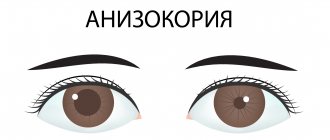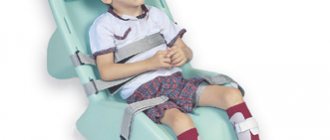Disorientation in space can be both a consequence of neurological diseases and their symptom. If we talk about the reasons for this phenomenon, then first of all let’s figure out what it is. Disorientation in space is usually also accompanied by temporary disorientation, that is, at such moments a person cannot understand where he is and what day or even year it is. This condition is dangerous both for the person himself and for others. After all, loss of orientation in space is often accompanied by an attack of panic, and in this case it is difficult to say what a person is capable of.
Loss of orientation in space: reasons
It is important to know the causes of disorientation in order to provide first aid in an emergency.
What could be the reason for the loss of disorientation in space? There are several of them:
- Alzheimer's disease;
- meningitis;
- renal failure;
- hypothyroidism; schizophrenia;
- hydrocephalus;
- epilepsy;
- Creutzfeldt-Jakob disease;
- manic-depressive disorders;
- encephalitis;
- hypoglycemia;
- brain tumors and cysts.
Note that the causes of disorientation can be not only this kind of illness, but also:
- altitude sickness;
- alcohol abuse;
- taking drugs or certain medications (tranquilizers, antiallergic drugs, painkillers, anti-inflammatory drugs, muscle relaxants);
- hypovitaminosis;
- dehydration;
- hypothermia;
- heatstroke;
- traumatic brain injury;
- infection;
- metabolic disorders;
- post-traumatic psychosis.
With improper nutrition, namely: insufficient intake of nutrients into the body, the brain begins to starve just like the body. Confusion and low blood sugar levels, and as a result, disorientation in space, are some of the consequences of improper diets.
In any case, and regardless of the reasons for the occurrence of such a condition, you should first contact a neurologist. Only a doctor, by conducting an examination and prescribing tests, can diagnose the true causes of disorientation in space.
Symptoms of spatial disorientation
There is a classification of orientation disorders, one of which is spatial disorientation; accordingly, there are general symptoms of loss of orientation, and there are those related specifically to loss of disorientation in space.
We recommend reading:
International Expert specialists on immigration to Germany for permanent residence from Russia
Are common:
- dizziness;
- memory problems;
- sleep disturbance;
- sudden change of mood.
Individual:
- a person’s inability to determine where he is, down to the country, and what time it is, up to a year, and also to identify himself as an individual: some data about himself is also erased from memory;
- a sudden wave of fear for no reason, close to a panic attack;
- a state of apathy that can unexpectedly turn into a state of aggression.
What are the symptoms of disorientation?
️The earliest symptoms of disorientation and confusion look like a deterioration in attention and ability to concentrate on something. As the disease develops, communication with the outside world is destroyed, gaps appear in memories, and logic is distorted. The person cannot understand what happened, ceases to recognize people and objects, and loses the ability to pronounce words.
️Because of this, he experiences stress, feels depressed, withdraws into himself and loses mobility. One skill or several at once may be affected. Sudden disorientation can be paroxysmal and go away over a period of time. Temporary disorientation is different from permanent disorientation. In the second case, signs such as delirium, dementia, hallucinations, limited mobility, and silence are visible.
️In the described condition, mental activity is disrupted, perception is distorted, and memories are lost. The perception of oneself as a person, one’s physical body, and other people changes. Memory of yourself and them becomes fragmentary or disappears completely.
Depending on the type of illness, different symptoms occur:
● Memory loss; ● Deterioration of attention; ● Sleep problems; ● Dizziness; ● Disconnected thinking; ● The appearance of visions, hallucinations; ● Apathy; ● Loss of concentration; ● Speech impairment.
️ Allopsychic disorientation means a lack of understanding of where a person is, the present place and time. The sufferer cannot name his location, is confused about calendar dates and time of day, and also does not know what year it is.
️ Sexual disorientation manifests itself as same-sex attraction, hatred of the opposite sex, and transgenderism. The reasons for such disorientation may be different, and this phenomenon is in the process of being studied. As an assumption, a hypothesis was put forward about a genetic predisposition, and there are also examples that sexual disorientation appears as a result of mental trauma and violence experienced.
️ Errative disorientation means speech impairment when pronouncing and writing words. People sometimes tend to be errative deliberately, creating slang expressions, but distorted speech can also be a symptom of a neurological and mental disorder.
️ Topographic disorientation means a lack of understanding of where a person is at the moment; he cannot name the locality, country, address and place of residence. It is this type of illness that most often occurs in elderly people who leave home in light clothing and wander the streets, not understanding where they are.
Disorientation in time and space, manifested due to brain damage due to trauma, concomitant illness or due to age. The patient cannot name the date, time, time of day, year, time of year and his location, as well as remember his own address, or go to the place where he lived for some time, but has long since left.
Loss of disorientation, or rather orientation, can occur suddenly and be temporary or develop gradually, conquering a person’s perception and depriving him of his usual guidelines in life. In this case, they say that complete disorientation has occurred and the patient disappears as a person. He falls into a confused state, becomes sedentary and withdrawn, does not speak, and performs a minimum number of actions, because he no longer understands what and when to do. Needs constant supervision and care.
Dizziness
One of the first and main symptoms accompanying disorientation in space. It can intensify with a sharp change in body position or turning the head. Internal causes include improper blood flow, the appearance of which is caused by an uncomfortable position when sitting or lying down. It can cause nausea, vomiting, darkening of the eyes, and pain in the forehead. In any case, this symptom should never be ignored: in addition to spatiotemporal disorientation, this can be caused by a number of neurological diseases. Especially if this happens regularly.
How to get rid of disorientation and confusion
First of all, you need to sit down and even out your breathing. It’s good if there are someone close to you or just caring passers-by who will help you get to the nearest medical center. Only an experienced doctor can diagnose the cause and how to deal with it. The treatment methodology depends on the causes of disorientation in space.
Dizziness
The first thing you need to do is answer all the doctor’s questions as honestly as possible: is this the first time you’ve had this, have you had any injuries, are you on any strict diet, have you previously been diagnosed with any neurological disorders. The doctor will prescribe a series of tests and studies, such as MRI or ultrasound, to most accurately diagnose the cause of loss of orientation in space. And this will be the basis for prescribing treatment.
If the symptoms are neurological, then treatment usually begins with ensuring complete rest for the patient. It is necessary to isolate it from surrounding stress and nervous stimuli and provide it with proper care. Next, prescribe medications: antidepressants, sedatives, antipsychotics, vitamins. Let us remind you that all this is taken strictly in accordance with the doctor’s recommendations; you absolutely cannot calculate the dosage and frequency of administration on your own! Otherwise, the situation may only get worse.
We recommend reading:
Stages of registering real estate in Turkey
If confusion is caused by external factors, such as a head injury, it is necessary to check whether it is a symptom of, for example, a concussion. If the problem is the wrong diet, you need to eat something high in calories and high in glucose. If this is due to taking medications, change the drug to an analogue or just something else and be sure to monitor the body’s reaction to taking it.
Loss of orientation
If this is the body’s reaction to alcohol, then it is better to refrain from drinking it completely, otherwise next time the consequences could be much worse. And take vitamins that strengthen the walls of the blood vessels in the brain. Which ones exactly - check with your doctor or pharmacist at the pharmacy. If there is an infection, confusion may be caused by a high fever. In this case, it is the infection itself that needs to be treated; ordinary antipyretics cannot achieve the desired effect; it is better to combine them with antiviral or antibiotics, depending on the type of disease.
In any case, so as not to cause loss of orientation in space, remember: a doctor and only a doctor can prescribe the correct treatment for you. Self-medication not only may not help, but can also be extremely destructive for your body.
Author of the publication
offline 3 years
Nika
10
I am interested in hiking and traveling, photography and videography. I have been going hiking since childhood. The whole family went and went - sometimes to the sea, then to the river, to the lake, to the forest. There was a time when we spent a whole month in the forest. We lived in tents and cooked over fires. This is probably why I am still drawn to the forest and, in general, to nature. I travel regularly. About three trips a year for 10-15 days and many 2 and 3 day hikes.
Comments: 0Publications: 668Registration: 10/23/2018
Nika Survival in the wild, Medical assistance, Articles
The inability to navigate in space is genetic
It's more fun without the gene
Bad mood and nervous disorders may be treatable at the genetic level. Scientists managed...
14 November 14:27
Imagine that you need to go to an unfamiliar place, and now you are getting out of the subway or driving a car. How often do you realize that you are moving in the wrong direction? Many people like to admit that they are completely unable to navigate and suffer from “topographic cretinism.” But both adults and children, as well as rats, chickens, fish and other animals, can (and should) correctly orient themselves in space based on external signs. In humans, for example, this ability is formed by the age of one and a half years. And the fact that even smart adults manage to get lost is often a consequence of poorly compiled maps and a lack of information signs.
An international team of scientists led by Barbara Landau of Johns Hopkins University found that
the ability to navigate is genetic in nature.
The corresponding article was published in the Proceedings of the National Academy of Sciences
. “To our knowledge, our work is the first evidence that genes are associated with the absence of a system that allows one to navigate in space,” says Landau.
close
100%
Williams syndrome (elf face syndrome)
- a syndrome that occurs as a consequence of a chromosomal pathology, the sufferers of which have a specific appearance and are characterized by a general mental retardation with the development of certain areas of intelligence.
Scientists made this conclusion by studying people with a rare genetic disease - Wilson's disease (elf-face syndrome). It develops as a result of chromosomal pathology, when there is a violation of the 7th chromosome, which leads to clinical cases of hypocapnia (excessive amount of carbon dioxide in the blood, in fact, chronic poisoning). This, in turn, leads to a general delay in a person’s mental development, although some areas of his intellect are well developed.
Scientists conducted a series of tests to determine how well people suffering from Wilson's disease can navigate in space. During the experiments, subjects had to find an object that was hidden under a dark cloth in front of their eyes. But the task for the subjects was complicated by the fact that, after the object was hidden, they were blindfolded and twisted for ten seconds to disorient them relative to the room. In addition, there were practically no landmarks in the room (in one experiment the walls of the room were black, in another one of the walls was painted blue).
But the room had a rectangular shape, which should have made the search easier.
close
100%
The authors compare these experiments to the children's game “pin-the-tail-on-the-donkey,” which is popular in English-speaking countries, in which a blindfolded player must correctly place the tail on a picture of a donkey. (Its name is also used when speaking about useless activities or about some helpless disabled person.)
People who have a normal orientation system would, for the most part, cope with the task without any problems, being “attached” to the shape of the room and remembering where the object was hidden. But those suffering from Wilson's disease showed a complete inability to navigate this situation.
“They looked for the missing item randomly, as if they had never seen the room before, did not notice the length of its walls and their position - to the right or to the left - in relation to them,” said Barbara Landau, lead author of the publication. - If they could imagine the general shape of the room, take into account the fact that the toy was hidden in the corner, and their position relative to the hiding place, they would immediately guess that there were only two geometrically equivalent corners where the loss could be found.
It develops in people aged 18 months.”
Tetris makes your brain bigger
Brain studies using magnetic resonance imaging have shown that classical computer…
09 March 13:48
A control group of healthy people confirmed that finding the object was quite easy. Based on experiments, scientists conclude that the reason for the disruption of the normal ability to navigate is associated with genetic pathology. According to the researchers, the results of their work provide another clue to studying the interaction of genes and brain development and to determining what exactly can lead to such disorders.
“Although we are far from understanding the connection between the specific genes that are missing in Wilson's disease sufferers and characteristics of the sufferers, such as the inability to navigate, it is clear that it is the lack of genes that affects the brain,” says Barbara Landau.







